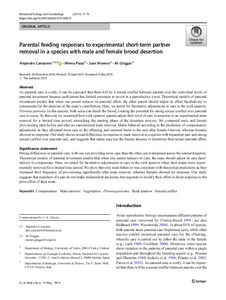Parental feeding responses to experimental short-term partner removal in a species with male and female brood desertion
Cantarero Alejandro; Plaza Mirea; Moreno Juan; Griggio Matteo
https://urn.fi/URN:NBN:fi-fe2021042825726
Tiivistelmä
As parental care is costly, it can be expected that there will be a
sexual conflict between parents over the individual levels of parental
investment because each parent has limited resources to invest in a
reproductive event. Theoretical models of parental investment predict
that when one parent reduces its parental effort, the other parent
should adjust its effort facultatively to compensate for the decrease in
the mate’s contribution. Here, we tested for facultative adjustments in
care in the rock sparrow, Petronia petronia.
In this species, both sexes can desert the brood, creating the
potential for strong sexual conflict over parental care to occur. To
that end, we examined how rock sparrow parents adjust their level of
care in response to an experimental mate removal for a limited time
period, mimicking the starting phase of the desertion process. We
compared male and female provisioning rates before and after an
experimental mate removal. Males behaved according to the prediction of
compensatory adjustment, as they allocated more care to the offspring
and returned faster to the nest after female removal, whereas females
showed no response. Our study shows sexual differences in response to
mate removal in a species with biparental care and strong sexual
conflict over parental care, and suggests that males may use the female
absence to determine their actual parental effort.
Kokoelmat
- Rinnakkaistallenteet [29337]
